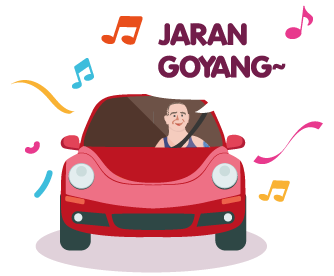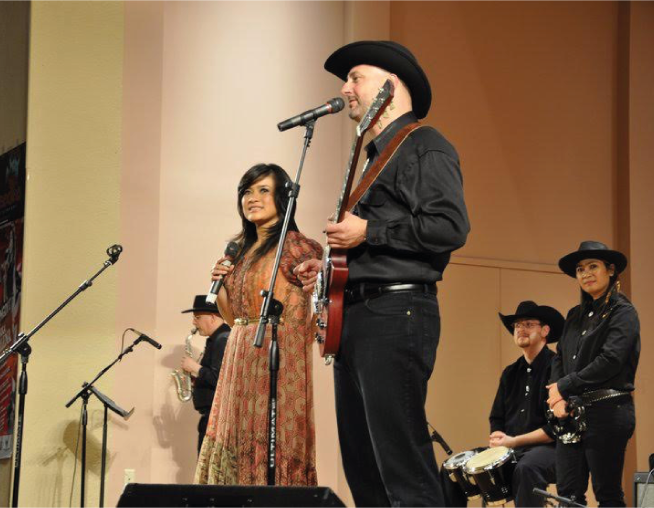
A melting pot of cultures, Indonesia is very fortunate to be blessed with a mix of Melayu, Indian, Arab, Chinese and European music, now known as dangdut. The popularity of the genre has reached far and wide; however, maybe not as far as the United States — or so one might think.
 In February 2018, a YouTube video featuring an American man belting Nella Kharisma’s dangdut hit “Jaran Goyang” while driving went viral and caught the attention of Indonesian social media users. The Americanized pronunciation of each Indonesian word within the song sounded uniquely foreign, but Indonesians were elated and praised the man’s efforts to sing dangdut. Lexis Mazerski, an engineer from California, briefly became an online sensation.
In February 2018, a YouTube video featuring an American man belting Nella Kharisma’s dangdut hit “Jaran Goyang” while driving went viral and caught the attention of Indonesian social media users. The Americanized pronunciation of each Indonesian word within the song sounded uniquely foreign, but Indonesians were elated and praised the man’s efforts to sing dangdut. Lexis Mazerski, an engineer from California, briefly became an online sensation.
Lexis Mazerski became an online sensation after singing Nella Kharisma's 'Jaran Goyang' on his YouTube channel (source: YouTube)
Lexis first fell in love with dangdut when he was vacationing in Bali and saw a dangdut concert being held across from his hotel. “Curiosity got the best of me, so I finally went to see what the commotion was all about. When I arrived at the ticket window, I saw a flyer for the event, which was titled ‘Lexis Rock Dangdut’,” he reminisced, “I suppose I took that as a sign that I was supposed to go inside. I bought my ticket, went in and was hooked ever since.”
Fast forward to 2018, and Lexis Mazerski is making simple videos featuring him on his daily 30-mile commute, singing dangdut and other Indonesian popular songs with gusto. “Getting to learn more about Indonesian culture through fun music has helped my soul,” he said. Dangdut has also helped him learn the Indonesian language. “I was trying different ways to help me build my vocabulary, and since I love music so much, I thought I’d learn the meanings behind the songs that I was enjoying the rhythm to. For each song I memorize, I retain about 40 percent of the vocabulary words until it appears in another song. Then the word pretty much sticks with me.”
Andrew Weintraub, an ethnomusicology professor at the University of Pittsburgh’s Department of Music, who dissected dangdut in his 2010 book, Dangdut Stories, is convinced that to sing dangdut one must have a full understanding of Indonesia. “For Americans, if they haven’t studied Indonesian music, it’s going to be difficult because the feeling of the music, the beat, it’s something really special and very specific to Indonesia.”
.jpg)
Aside from teaching, Weintraub also performs dangdut on special events with his band, Dangdut Cowboys, formed in 2008. “I started Dangdut Cowboys, which was meant to introduce the music to people in the US, and to also help create a dialogue with Indonesian musicians,” he said, adding that the band had also performed alongside Indonesia’s legendary dangdut singers, including Rhoma Irama, Ikke Nurjanah and others.
The Dangdut Cowboys performed with Rhoma Irama (source: YouTube)
Although he has performed dangdut with his own band, Weintraub is skeptical about the potential of success for Americans performing dangdut. “It’s really hard to predict. Reggae is a great example, because nobody could predict the popularity of the genre. Coming from the small island of Jamaica, it’s very different from a lot of music, but as we look back on it, we can understand why reggae became popular, and one of the reasons is it’s in English.”
"It is very important that the singers understand the Indonesian language. In fact, I think they have to spend some time living here."
- Andre YahyaDangdut veteran Andre Yahya agrees with Weintraub. “It is very important that the singers understand the Indonesian language. In fact, I think they have to spend some time living here.” He also pointed out the aspect of Indonesian pride: “Rhoma Irama did a show in America with the dangdut professor, but he won’t speak in English, even though he can. This also happens with Ikke Nurjanah, Evie Tamala — they all speak good English, but they only speak and perform in Indonesian. This is why I think dangdut songs are much like Korean songs. They have to be sung in their own original language.”
Thomas Djorghi, a dangdut singer from the younger generation in Indonesia who has been helping Rissa in her mission of popularizing the genre in the US, said while language and accent is a problem, it could be the selling point of foreign dangdut singers, which appeal to the Indonesian market.
“Language is the hardest to tackle. It’s just like when Indonesians sing in English — we can sing it, but we won’t sound like a native English speaker. It’s hard to get these singers to sing as an Indonesian would,” he admits. “However, several local music producers advised me to keep their English pronunciation because if they sound too Indonesian, people will think they have stayed here for quite some time, hence losing their unique appeal,” Thomas added.
 Rissa also attempted to insert international flavor in dangdut, when in 2008 she had Arreal Tilghman sing a song titled “I Love You”, written by Husain Audah and Asmin Cayder. Another English-language dangdut song he sung was titled “Puzzle of Love”, also released in 2008.
Rissa also attempted to insert international flavor in dangdut, when in 2008 she had Arreal Tilghman sing a song titled “I Love You”, written by Husain Audah and Asmin Cayder. Another English-language dangdut song he sung was titled “Puzzle of Love”, also released in 2008.
Arreal Tilghman - "I Love You" (source: YouTube)
Tilghman’s unsuccessful attempt at delivering dangdut to Indonesians, according to Weintraub, is due to the singer’s lack of understanding of Indonesia. “I think the language is important, and also making a connection with the Indonesian people. Dangdut is not just about singing the lyrics and putting out the product. Rhoma Irama’s fans feel like they are his family. [Tilghman] was missing that family feeling that makes people identify with him.”
The challenges
In 2016, the Creative Economy Agency (Bekraf) has stated that it would push dangdut as the music of the nation onto the world stage with the “Hello Dangdut” program. Bekraf deputy head Ricky Joseph Pesik said the agency had ambitious goals to raise dangdut onto the same level as Jamaica’s reggae and South Korea’s K-pop.
“We now have a strategy called Hello Dangdut, a commercial campaign aimed at the international market; hence it’s not marketed here,” he said, acknowledging the still small number of efforts that Bekraf had already made to promote dangdut.
“We haven’t done a lot of things, but the big idea is to have a market-oriented dangdut information system for the international audience, which will contain all sorts of documentations regarding dangdut.” Also in Bekraf’s plans is to create communication tools to help introduce dangdut to international audiences.
The US is included in Bekraf’s main target as, according to Ricky, it’s the main hub of leading music platforms as well as the world’s key music industry players. “We will do market research and widen our network, not only in the US, but also in Japan, as dangdut is already a popular music genre in Japan.”
One of Bekraf’s first steps in its plans with dangdut was the incorporation of a Hello Dangdut Center in the locally held 2017 Synchronize Fest, where the agency featured non-dangdut singers Andi /rif and Lala Karmela, who performed popular dangdut songs to reach the younger audiences. “The middle-class millennials are surprisingly receptive to the new dangdut flavor; it was not as hard as we thought it would be,” Ricky said.
The agency has also supported dangdut songstress Ikke Nurjanah on her American tour under the Hello Dangdut umbrella. “As a part of our international efforts, we would also like to test if dangdut can be absorbed by international DJs,” Ricky added, stating the importance of having the courage to feature dangdut in electronic dance music (EDM) festivals as a way to grab more attention. “Here in Indonesia, we have Djakarta Warehouse Project [DWP], Japan has Summersonic and Europe has Tomorrowland. It is a part of our strategy to include dangdut in those festivals, and this strategy involves a number of competent stakeholders, including those in music and international marketing so the plans can finally materialize,” he said.
Bekraf may have huge, idealistic and positive plans for dangdut, but to add to the lack of execution actions, there are problems — one of which, ironically, is love for dangdut possessed by Indonesians abroad. “We want to go commercial, so it is a struggle to enter the international market because 80 percent of the events we held abroad were attended by Indonesians,” Ricky said. “It’s not that we don’t want to entertain Indonesians, but Hello Dangdut is aimed at the international market.”
“Mabuk Lagi” - Cucu Cahyati
“Mabuk Lagi”
Duhai tunanganku
Sampaikan pada orangtuamu
Tahun depan ku melamarmu
Akan kubelikan mobil biru
Mabuk lagi ah mabuk lagi
Judi lagi … judi lagi …
Kau bawa teman-teman
Hai mabuk bersamamu
Kau ajak teman-teman
Hai judi bersamamu
Mabuk lagi, judi lagi
Ku tak mau terus begini
Putuskan saja hubungan
Jangan lagi bertunangan
Ku tak mau jadi istri
Kalau kau terus begini
Mabuk lagi … judi lagi …
Baiklah oh sayangku
Tolong ambilkan air aki
Eh salah … maaf …
Akan kudengarkan katamu
Ku tak akan mabuk lagi
Dan ku tak akan judi lagi
Tak baik sering minum
Apalagi minuman keras
Ditambah lagi judi
Membuat kau malas
Mukamu kusut
Hei rambut acak-acakan
Malah sering kau tertidur
Di pinggir jalan
Bagaimana kau menyayangiku
Sedang dirimu tak kau sayang
“Drunk Again”
Hello, my fiancée
Please tell your parents
Next year I will propose
And give you a new car
You get drunk and gamble again
With your friends, getting drunk
With your friends, gambling
You get drunk and gamble again
I don’t want it to be like this
Just break up with me
I don’t want to be engaged anymore
I don’t want to be your wife
If this is how you’re going to be
Drunk again, gamble again
Alright darling,
Please get me battery water
I’m sorry
I will listen to your words
I will not get drunk again
And I will not gamble again
It’s not good to drink too much
Especially alcoholic drinks
Plus gambling makes you lazy
Your face, gloomy
Hair disheveled
You sleep on roadsides a lot
How are you going to love me
When you don’t love yourself
“Termiskin Di Dunia” - Hamdan ATT
“Termiskin Di Dunia”
Bukan ku menolakmu untuk mencintaiku
Tetapi lihat dulu siapakah diriku
Karna engkau dan aku sungguh berbeda
Kau orang kaya, aku orang tak punya
Sebelum terlanjur fikir-fikirlah dulu
Sebelum engkau menyesal kemudian
Jangankan gedung gubukpun aku tak punya
Jangankan permata uangpun aku tiada
Aku merasa orang termiskin di dunia
Yang penuh derita bermandikan airmata
Itulah diriku ku katakan padamu
Agar engkau tau siapa aku
"The Poorest in the World"
It’s not that I reject your love,
But please take a look at who I am
Because you and I are very different
You’re rich and I am poor
Before we get too deep, please give it a thought
Before you regret this in the future
Don’t speak of buildings, I don’t even have a hut
Don’t speak of diamonds, I don’t even have money
I feel like I’m the poorest in the world
Who lives in misery and bathed in my own tears
That is me, I’m telling you
So you know who I really am
“Mandul” - Rhoma Irama & Elvi Sukaesih
“Mandul”
Sepuluh tahun sudah kita berumah tangga
Tapi belum juga mendapatkan putra
Jangan kau sedih jangan berduka
Mohon pada-Nya dalam berdoa
Sebagai seorang isteri ‘ku merasa sedih
‘Ku takut dirimu kecewa padaku
Cintaku padamu tak akan pudar
Walau seumur hidupmu dalam kemandulan
Cintaku padamu tak akan pudar
Walau seumur hidupmu dalam kemandulan
Kurasa tiada sempurna kebahagiaan kita
Tanpa adanya seorang putra belahan jiwa
“Barren”
Ten years we’ve been married
But yet to be blessed with a child
Don’t be sad and mournful
Ask God in your prayers
As a wife, I feel sad
I am afraid you’ll be disappointed in me
My love for you will never fade
Although we’re barren for life
My love for you will never fade
Although we’re barren for life
I feel our happiness is imperfect
Without a child as part of our soul
| Managing Editor Life | : | Asmara Wreksono |
| Editors | : | Keshie Hernitaningtyas, Maria Wening Gitomartoyo,
Muthi Achadiat Kautsar |
| J+ Team | : | Jessicha Valentina, Ni Nyoman Wira, Liza Yosephine |
| Technology | : | Mustopa |
| UI/UX Designer | : | Sandy Riady Hasan, Kevin Setiawan |
| Multimedia | : | Bayu Widhiatmoko, I Gede Dharma JS, Ahmad Zamzami,
Rian Irawan, Wienda Parwitasari, Brian Ariawan |



 “Nobody came on the first day, as they didn’t know what dangdut was. The second day, the crowd picked up, and on the third day I selected three people, trained them for a month and surprisingly, it worked.”
“Nobody came on the first day, as they didn’t know what dangdut was. The second day, the crowd picked up, and on the third day I selected three people, trained them for a month and surprisingly, it worked.”




